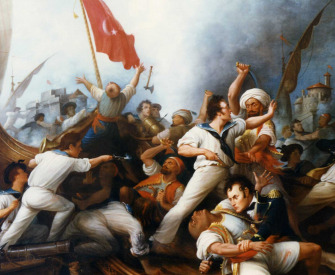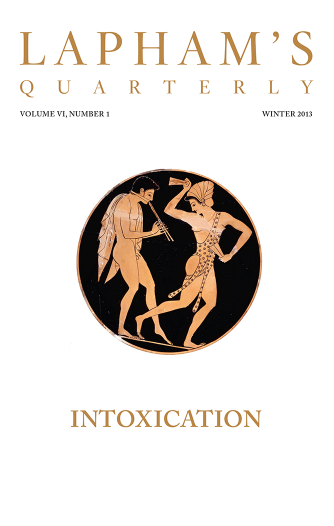Daqin [Roman Syria] was first communicated with during the later Han dynasty. Its king resides at the city of An-tu [Antioch]. In the palaces they use crystal in making pillars.
From Tiaozhi [Babylonia] west, crossing the sea, you make a crooked journey, ten thousand li. This country is even and upright; human dwellings are scattered over it like stars. Its territory amounts to a thousand li from east to west and from north to south. It contains over four hundred cities and several tens of small tributary states. In the west there is the Great Sea [the Mediterranean]. On the west of the sea there is the royal city of Ali-san [Alexandria]. They have keepers of official records and foreigners trained in reading their writings. They cut their hair and wear embroidered clothing. They also have small carriages with white canopies, and hoist flags, etc. The country contains many lions, which are a great scourge to travelers; for unless going in caravans of over a hundred men and being protected by military equipment, they will be hurt by them.
Among precious stones they have the xiejixi [chicken-frightening rhinoceros]. Gold, silver, and rare precious things are produced in the country; the jewel that shines at night, the moonshine pearl, amber, opaque glass, tortoises, white horses, red bristles, tortoiseshell, black bears, red glass, the pidushu [a kind of rat], large conches. There is further the Munan, a pearl of jade color originating in the coagulation of saliva in the mouth of a flying bird; the natives consider it a precious substance. With regard to the fine cloth manufactured on their looms, they say they use the wool of water sheep in making it. They make all kinds of rugs; their colors are still more brilliant than those manufactured in the countries on the east of the sea. They always made profit by obtaining the thick plain silk stuffs of China, which they split in order to make foreign ling gan wen [damask and purple-dyed mustered goods], and they entertain a lively trade in this with the foreign states of Arxi [Arsacids, or Parthia] by sea.
In this country they make gold and silver coins; ten silver coins are worth one gold coin. The inhabitants are just in their dealings, and in the trade there are not two prices. Cereals are always cheap, and the budget is well supplied. When the envoys of neighboring countries arrive at their furthest frontier, they are driven by post to the royal capital and, on arrival, are presented with golden money. Their king always wished to send envoys to China; but the Arxi wished to carry on trade with them in Han silks, and this is the cause of their having before been shut off from direct communication. It was, further, hard to cross the great sea, traveling merchants taking three years’ provisions on board to make this passage, whence the number of travelers was but small.
So it was not until the beginning of the Yuanjia period of Emperor Huandi [151–53] that the king of Daqin, named An-tun [Marcus Aurelius], sent envoys who offered ivory, rhinoceros’ horns, and tortoiseshell; this was the first time they communicated with us. But their tribute contained no precious stones whatever, which fact makes us suspect that the messengers kept them back.
In the Waiguotu [Map of foreign countries] it is said about Daqin that in the western sea there is a market where a silent agreement exists between buyer and seller that if the one is coming, the other will go, and vice versa; the seller will first spread out his goods, and the purchaser will afterward produce their equivalents, which have to wait by the side of the articles to be sold till received by the seller, after which the purchase may be taken delivery of. They call this a spirit market.
From General Study of the Literary Remains. An institutional history of China from its origins to the Song dynasty, during which Ma served as a government minister, this 348-volume text was completed in the early fourteenth century and was intended as a moral guide to statecraft following the Mongol invasion of China. An imperial envoy named Zhang Qian had established contact with Central Asia around 138 bc, opening the trade route that became known as the Silk Road.
Back to Issue




